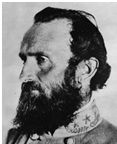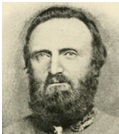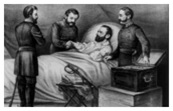|
 |
|
 |
Thomas (“Stonewall”) Jackson Leadership
Thomas (“Stonewall”) Jackson (1824-1863)
Confederate general in the American Civil War and deputy to Robert E. Lee. After several great victories, he (pictured right) was killed at the Battle of Chancellorsville (1863).
For more detail see... The Battle of Gettysburg in the History Highlights section.
Why was he a great leader?
1. Determined and courageous The death of his parents, and his limited education, didn’t stop him becoming an army officer. At the first Battle of Bull Run (1861) his stout resistance to the enemy advance earned him the nickname “Stonewall”. He led from the front and continually risked his life for his men, his courage increasing as the danger rose. His favourite maxim was “never take counsel of your fears”.
2. Integrity Jackson (pictured right in 1862) was a devout Christian (openly praying with his men before battle) who practised what Jesus preached: love, self-control and humility. He was a good man and always did his duty so his men trusted and loved him.
3. Servant leader He would do anything for his men. He was not only kind but also tough enough to instil discipline, ruthlessly punishing incompetence and disobedience. But he got on much better with ordinary soldiers than his senior officers (he unfairly arrested three of his generals for incompetence!)
4. Self-confidence He never doubted his ability (with God’s help) to defeat the enemy and had a very positive, ‘can do’ attitude.
5. Speed and communication Jackson (pictured right as a young man) knew that speed and surprise (demonstrated by his famous “foot cavalry”) were vital weapons in battle. He clearly communicated his orders, but his obsession with secrecy (to confuse the enemy) meant that even his senior officers didn’t know his plans. This proved disastrous at the Battle of Chancellorsville, when he was fatally injured in a secret, quick attack
6. Imagination, simplicity and energy He showed great imagination in finding new ways to defeat the enemy, but they were never complicated. His battle plans were simple (attack the enemy’s weaknesses and avoid its strengths and
frontal attacks) and quickly carried out, seizing the initiative and never giving it away to the enemy.
He boldly attacked the enemy’s right flank at the Battle of Chancellorsville that only failed because of delay caused by a huge storm and Jackson’s death (pictured right). He was never happy until the enemy had been totally destroyed. “War means fighting”, he said.
7. Patience and caution He always waited before picking the right time to attack. When he took risks, they were calculated and necessary ones He never tried to achieve the impossible.
8. Knowing the enemy His cavalry always spied on the enemy, using this information and his intuition to make brilliant judgements about the enemy and its morale. He was obsessed with observing its every movement to get inside the mind of his opponents. He thought of every possible attack from them, so he was never surprised. 9. Good people He picked a brave and skilful army and he had the humility to realize he could do nothing without its support. He had:
10. Co-ordinator He brilliantly combined the three parts of his army, infantry, cavalry and artillery.
11. Devoted deputy He was devoted to his boss, Robert E. Lee (pictured right), and always obeyed his orders. “I would have followed him blindfolded”, he said.
12. Thoroughness and priorities He considered even the smallest detail necessary for victory and concentrated on what was most important.
13. Happiness He loved his job. A friend described him as “the happiest man I know”.
Key quotes on leadership and management Always mystify, mislead and surprise the enemy, if possible. My duty is to obey orders.
Key quote on strategy To move swiftly, strike vigorously and secure all the fruits of victory is the secret of successful war.
Key quote on religion Religious belief teaches me to feel as safe in battle as in bed.
|
|
|
||
|
|
|
||
|
||
| Copyright © wisdomtowin.com All Rights Reserved | ||
|








